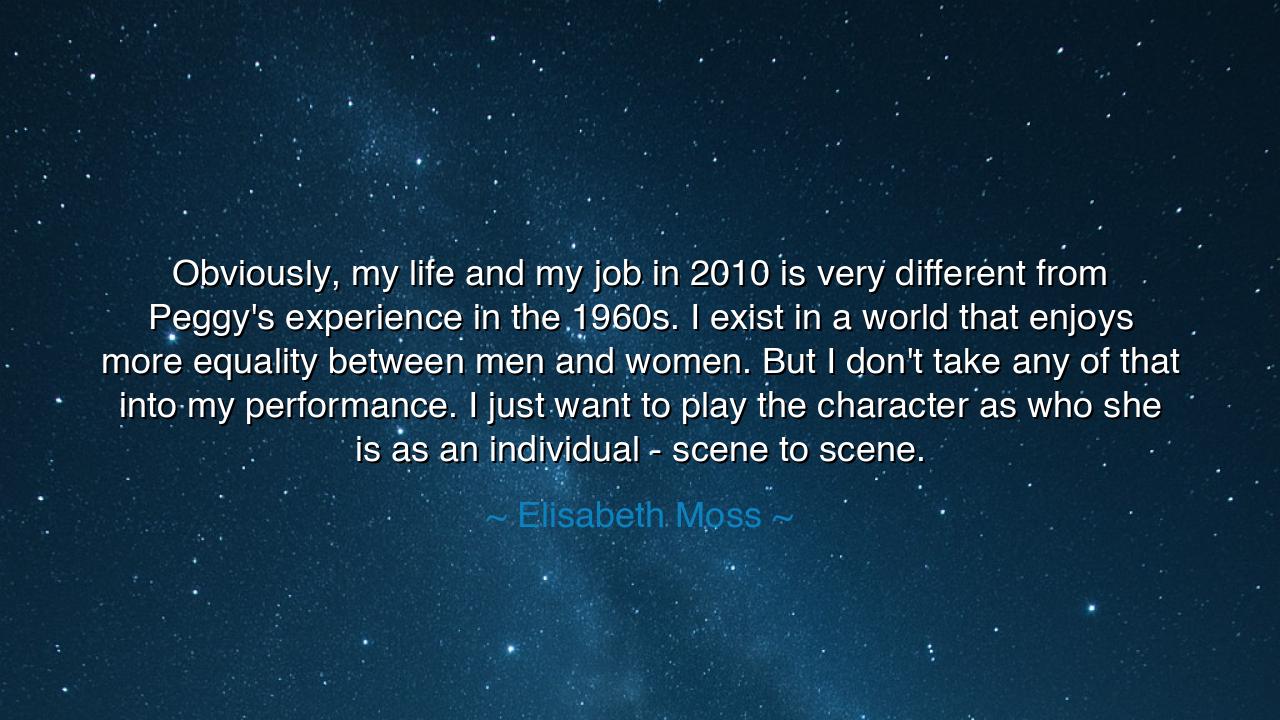
Obviously, my life and my job in 2010 is very different from
Obviously, my life and my job in 2010 is very different from Peggy's experience in the 1960s. I exist in a world that enjoys more equality between men and women. But I don't take any of that into my performance. I just want to play the character as who she is as an individual - scene to scene.






When Elisabeth Moss reflected, “Obviously, my life and my job in 2010 is very different from Peggy's experience in the 1960s. I exist in a world that enjoys more equality between men and women. But I don't take any of that into my performance. I just want to play the character as who she is as an individual—scene to scene,” she revealed both the wisdom of an artist and the struggle of a generation. Her words remind us that equality, hard-won over decades, is not simply a backdrop to be admired—it is the ground upon which the present stands. Yet when portraying the past, she must set aside the privileges of her time to honor the truth of another era.
The meaning of this quote is rooted in the distinction between history and individuality. Moss acknowledges that the world of the 1960s—the world of her character Peggy Olson in Mad Men—was bound by barriers that restricted women in work, power, and expression. In contrast, Moss in 2010 lives in a society that has pushed forward into greater equality between men and women. Yet as an actress, she does not impose her present understanding onto Peggy; she steps into the reality of the character as she was, confined and striving within the limits of her time. This is the discipline of truth: to live the moment as it was, not as we wish it to be.
The origin of these words lies in Moss’s journey as an actress and in the cultural weight of the character she portrayed. Peggy Olson represented the rising woman in the workplace of the 1960s, pushing against invisible walls of sexism and prejudice. To play her with authenticity, Moss had to embrace the struggles of that era without the lens of hindsight. Her craft demanded humility—the ability to shed her own freedoms and embody the battles of another time, showing audiences not an idealized heroine, but a human being.
History offers us a parallel in the story of Harriet Beecher Stowe, who wrote Uncle Tom’s Cabin not as a tale of future freedom but as an unflinching portrait of slavery as it was. She did not smooth the edges with the optimism of emancipation that would come later; she depicted the cruel reality of her own age. In doing so, she gave truth its power, moving hearts to action. So too, Moss in her portrayal teaches us that honesty about the past—however painful—is necessary to illuminate the struggles that made the present possible.
The wisdom of Moss’s words is this: every character, like every person, is an individual, not merely a symbol. Peggy Olson is not simply “woman in the 1960s workplace”—she is Peggy, with her own flaws, ambitions, fears, and triumphs. By honoring the individuality of the character rather than flattening her into an archetype, Moss preserves the dignity of truth. And in truth, the greater lessons emerge: the courage it took for women like Peggy to rise, the sacrifices they endured, and the path they carved for those who came after.
The lesson for us is clear: we must not erase the struggles of the past by viewing them only through the lens of the present. Instead, we must honor those who lived in difficult times by seeing them as they were, acknowledging both their humanity and their limitations. Only then can we truly appreciate the progress of equality and guard against complacency in our own time. For what is gained can also be lost, unless we remember what it cost to win it.
What then must the listener do? Approach history, and the people within it, with humility. Do not rush to judge them only by modern standards, nor to dismiss their individuality by casting them as mere symbols. Whether in art, in study, or in life, strive to see each soul as Moss saw Peggy—as an individual, scene by scene, moment by moment. Let this truth guide you: that progress is built not on abstractions, but on the real lives of those who struggled before us.
Remember always: equality is a gift of the present, won by the labor of the past. To honor it, we must both embody the freedom of today and remember the chains of yesterday. As Moss teaches, the greatest wisdom lies in truth—truth to the moment, truth to the individual, and truth to the struggle that brought us here.






AAdministratorAdministrator
Welcome, honored guests. Please leave a comment, we will respond soon